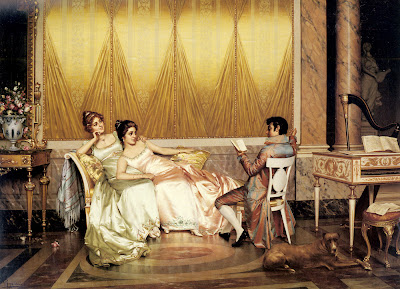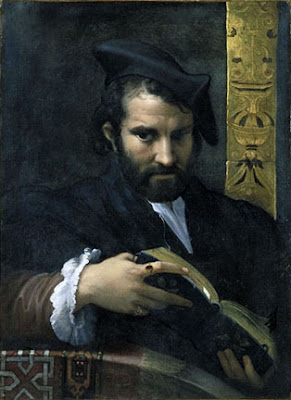Recently, 13,000 people voted on their favourite Harry Potter characters. The results
can be found here, if you're interested. And what do you know? Snape was the Winner.
Now, not that I have anything against Snape, but I just don't see him as that person. After I finally deigned to read the first novel in my last few years of school (2003, 2004), I fell in love with the novels and ABSORBED them into my being. I read them over and over, I researched them, I joined Mugglenet and debated anything about the books on the forums and tried to earn virtual Galleons, I became intensely angry when I heard uninformed anti-Harry-Potter sentiment, I sent J. K. Rowling letters.
And I definitely remember spending entire lunch breaks (and a surprising amount of the next period as well) debating the best characters with my friends Katie and Jenna. Snape just didn't cut it.
Of course, we'd only made it up to book four at this stage. And we were basing our opinions on the books we'd read, not on the treacle tones of Alan Rickman.
I have to admit that I did come across one obsessive Snape fan. This was after I had formed a yahoo group for Christians who love Harry Potter (naturally), and we had one member who furiously insisted that Snape was still a good guy even after he killed Dumbledore. She turned out to be right. But I didn't take her opinion very seriously after she also insisted that Harry and Hermione should have fallen in love, not Ron and Hermione, because this was the 'biblical model'. Er, if you say so.
Anyway. The point is, I think Snape is a good character, and one of the most interesting characters. He's the sort of character you can really get your teeth into in a good debate. In the end, his story is rather irresistible. He also has the fact that he is a not an angsty teenager going for him, especially in books 4 or 5. But he's not really the sort of character one warms to. He's just not "Favourite" material, at least, not number one favourite.
And it's not just that. What are characters like the Dementors doing in the Top 40, for crying out loud? Or Lucius Malfoy? Crabbe and Goyle?! DOLORES UMBRIDGE?!?!
So I am going to fix the Favourite Harry Potter Character List. The Guardian shows the top 40; so will I.
Oh, and hello to all the Snape fans making their way here from
sites like this or
this. I think perhaps the "sour grapes" might be yours, but, if not, thank you for putting up with my "tantrum" and allowing that sometimes people have different opinions. It has been approximately three months since I last read through the series. And please don't call me "Hon".
Sheesh.
If you read what I've written without a pre-determined conclusion in mind, you would notice that I absolutely agree that Snape is an important character, a great character. I just don't want him to be my BFF.
I invite you to leave your comments about MY juvenility, arrogance and/or complete wrongness here, to my face, non-anonymously, as opposed to the completely grown-up and academically-sound method of preaching vitriol to the choir on your forums.
(By the way, however, I am willing to admit that my definition of "favourite" is slightly skewed. For me, it does signify the HP characters for whom I feel an affection. Actually, if I were to make a Top 40 list of All Fictional Characters and choose them based on their well-roundedness or fascination, Snape might just be on it. I just felt like doing it this way, this time, and it's not supposed to be read as a studied insult to Snape. There. I hope my apology is accepted.)
Here are my choices. They are all based on the characters of the books, not the presentations of those characters in the movies.
1. Hermione Granger -
because she saves the world through bookishness2. Luna Lovegood -
because she is too delightful for words3. Harry Potter -
a true Gryffindor! I think we all see a little of ourselves in him.4. Rubeus Hagrid -
who couldn't love him?5. Gilderoy Lockhart -
the star of The Chamber of Secrets, which is, in my opinion, the funniest book6. Minerva McGonagall -
I love her. Especially when she marshals an army of desks, or charges off to stop people arresting Hagrid.7. Augusta Longbottom, Neville's grandmother -
so she doesn't get much coverage - but what she gets is enough to place her in the top ten. What a great character. Strong women for the win.8. Arthur Weasley -
for many reasons but this is one of them:
He looked around, saw Harry and jumped.
'Good Lord, is it Harry Potter? Very pleased to meet you, Ron's told us so much about -'
'Your sons flew that car to Harry's house and back last night!' shouted Mrs Weasley. 'What have you got to say about that, eh?'
'Did you really?' said Mr Weasley eagerly. 'Did it go all right? I-I mean,' he faltered, as sparks flew from Mrs Weasley's eyes, 'that-that was very wrong, boys - very wrong indeed...'
'Let's leave them to it,' Ron muttered to Harry, as Mrs Weasley swelled like a bullfrog.
9. Sirius Black -
only this low on the list because he annoyed me so much in book five. He is pretty fantastic though.10. Ron Weasley -
who is a good friend but whose insecurities drove me a bit mad11. Mad-Eye Moody -
is it wrong that he makes it this far up the list mostly because of Barty Crouch Jr's interpretation of him?12. Neville Longbottom -
we all love Neville, right?13. Albus Dumbledore -
whimsical, wise, powerful, and compassionate - but also very flawed. I've moved him down the list because I realised that I didn't like a lot of the things we found out about him later, especially that he'd been planning Harry's eventual death from early on. I know it all worked out in the end but this lent a certain chilliness to his kindness.14. Colin Creevey -
a wonderful character. He was the most distressing part of the end of book 7.15. Lily Potter -
somehow she manages to be wonderful from beyond the grave16. Dobby -
I think it's the Harry-Potter-ized Christmas baubles that cemented Dobby's place in my heart17. Hedwig -
a constant companion for Harry18. Remus Lupin -
he would have been higher had he not got so moody later on 19. Fred Weasley -
the Weasley twins together are rather wonderful. Especially in their business ventures.20. George Weasley
21. Molly Weasley -
as generous and warm as her name suggests22. Fleur Delacour -
for her unexpected warm-heartedness23. Peeves -
for his finest hour:
Fred looked across the hall at the poltergeist bobbing on his level above the crowd.
'Give her hell from us, Peeves.'
And Peeves, who Harry had never seen take an order from a student before, swept his belled hat from his head and sprang to a salute ...
24. Sybill Trelawney -
for whom you can't help feeling a slightly annoyed affectionProfessor Trelawney broke into hysterical sobs during Divination and announced to the startled class, and a very disapproving Umbridge, that Harry was not going to suffer an early death after all, but would live to a ripe old age, become Minister for Magic and have twelve children.
25. Mundungus Fletcher -
I love him despite his faults. His name helps.26. Severus Snape -
And here he is. A great character.27. Nearly Headless Nick -
Poor old Nick and his desire to join the Hunt. His Deathday Feast is one of my favourite Harry Potter scenes.28. James Potter -
Almost but not quite as charming as his wife29. Kreacher -
Yes, this is strange, but first you feel sorry for him and then he becomes nice - it's a winning combination.30. Stan Shunpike -
I wish Stan hadn't been Imperiused. But he and his pimples have a firm place in my heart regardless.31. Narcissa Malfoy -
Now this is strange. And yet she, like Snape, is a complicated character. Not entirely irredeemable.32. Horace Slughorn -
is hilarious33. Grawp -
his piteous cry for "HAGGER! HAGGER!" left tears in my eyes34. Dudley Dursley -
almost for his name alone35. Percy Weasley -
for the comedy at his expense in the first few books. For his eventual redemption from bureaucracy at the end.36. Lee Jordan -
almost as funny as Fred and George37. Griselda Marchbanks -
for siding with Dumbledore in the Wizengamot38. Draco Malfoy -
I can't really bring myself to feel VERY sorry for Draco... but I feel like he deserves to be in the top 4039. Dedalus Diggle -
for his part in book 140. Professor Flitwick -
for always being cheerful, and for being able to levitateWho are your favourites?
Coming up - most loathed Harry Potter characters.



















































